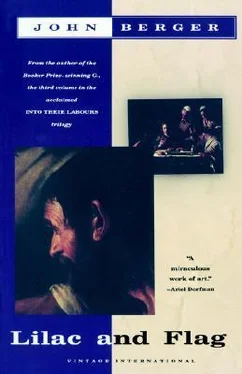Then he wept for a millennium, there in my grass beside me.
When all was done and his eyes were dry, he stared at the sky and said: If I become that blue, old woman, nothing, nothing any more will separate me from Zsuzsa.
Yes, I whispered, I have taken off your coat of bees, yes, no more words … Sleep, Sucus, sleep. She’s alive.
IT IS POSSIBLE you have been to Troy without recognising the city. The road from the airport is like many others in the world. It has a superhighway and is often blocked. You leave the airport buildings which are like space vessels never finished, you pass the packed carparks, the international hotels, a mile or two of barbed wire, broken fields, the last stray cattle, billboards that advertise cars and Coca-Cola, storage tanks, a cement plant, the first shanty town, several giant depots for big stores, ring-road flyovers, working-class flats, a part of an ancient city wall, the old boroughs with trees, crammed shopping streets, new golden office-blocks, a number of ancient domes and spires, and finally you arrive at the acropolis of wealth.
Should you visit Troy again, you will recognise Zsuzsa. It is impossible that you won’t now be able to pick her out from among the many thousands of faces, that fill the streets and corners and stations of the city every night. You would recognise her even from far away. Perhaps she will be singing for money in a train on the Eddington Line. Perhaps she will be seated, waiting, on a high stool against a bar, skirt pulled high up and legs crossed, in Sankt Pauli. Perhaps she will be married, the mother of several children, and when you pass her she will be pushing a pram. I do not know, for her life is not yet over.
Perhaps you will recognise her in one of the aisles of Santa Barbara where she will have gone to pray. Wislawa will go, whenever she can, to the same cathedral to pray for Branch and Sucus. Despite her losses, her poor health, her eyes, her poverty, Wislawa will find the strength to continue a little longer, for she has perched in the tree of God. I do not know whether the two women will ever meet there, where the mosaics on the floor tell the Story of Saint George.
Perhaps it will be in the Champ-de-Mars that you will pick out Zsuzsa and she will be on her way to visit somebody in prison. If you dare go to Rat Hill, perhaps she will be living there in another shack, and she will look like an old woman.
Poverty, loss, pain, passion, time or money will have marked her eyes, her hands, her mouth and the way she holds her arms and the way she places her feet, but they will not, I think, have changed her soul; in order to play this world she will still believe, and make others believe, that she’s its centre, its prize and its capital, and she is probably right.
If you doubt and ask yourself whether it’s really her, and you’re lucky enough to be close to her, you’ll be able to know by her two missing teeth and the long scars on her scalp, only partly hidden by her unruly, once-black hair … that it is really Zsuzsa.
Don’t fret, my little one. Fly! Everything’s going to be all right. Fly, my Heart.
The trilogy Into Their Labours has occupied me during the last fifteen years. During this period, Tom Engelhardt has edited my books. Dear Tom, you have encouraged, corrected, and upheld me. Thank you.
Perhaps I would never have had the courage to begin the project if I had not received, before a page was written and until today, the support of the Transnational Institute in Amsterdam. To everyone in Paulus Potterstraat and Connecticut Avenue and to Saul Landau, thank you.












